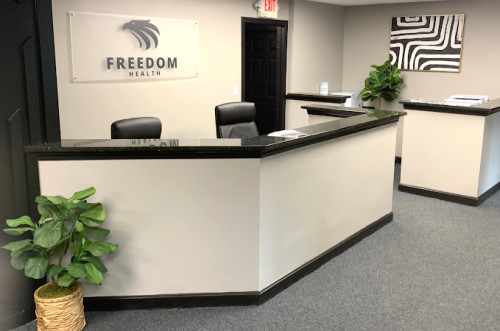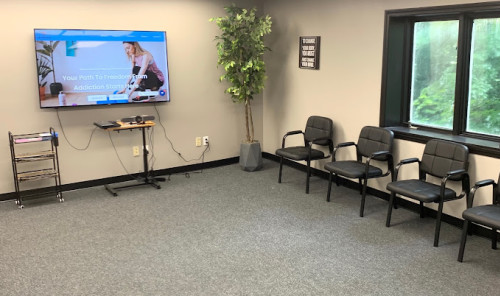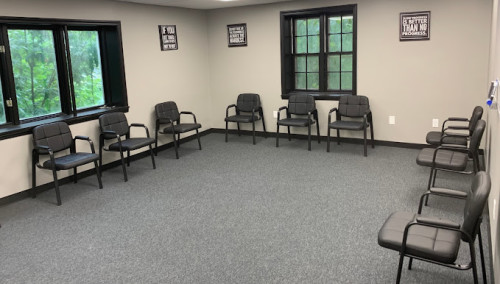






Freedom Health
Treatment Focus
This center treats substance use disorders and co-occurring mental health conditions. Your treatment plan addresses each condition at once with personalized, compassionate care for comprehensive healing.
Primary Level of Care
Outpatient treatment offers flexible therapeutic and medical care without the need to stay overnight in a hospital or inpatient facility. Some centers offer intensive outpatient program (IOP), which falls between inpatient care and traditional outpatient service.
Claimed
Recovery.com has connected directly with this treatment provider to validate the information in their profile.
Treatment Focus
This center treats substance use disorders and co-occurring mental health conditions. Your treatment plan addresses each condition at once with personalized, compassionate care for comprehensive healing.
Primary Level of Care
Outpatient treatment offers flexible therapeutic and medical care without the need to stay overnight in a hospital or inpatient facility. Some centers offer intensive outpatient program (IOP), which falls between inpatient care and traditional outpatient service.
Private Pay
You pay directly for treatment out of pocket. This approach can offer enhanced privacy and flexibility, without involving insurance. Exact costs vary based on program and length of stay. Contact the center for specific details.
Freedom Health
Freedom Health
About Freedom Health
Freedom Health is an outpatient treatment facility offering flexible and comprehensive care through their partial hospitalization program (PHP), intensive outpatient program (IOP), and outpatient program (OP) for individuals struggling with dual-diagnosis disorders. Their compassionate staff members are dedicated to assisting in the building of a foundation for sustainable recovery for clients and their families.
Comprehensive and Holistic Care
The partial hospitalization program (PHP) at Freedom Health is their highest and most intensive level of care. PHP is typically less restrictive than residential treatment while still providing a high level of medical and psychological support, offering clients much more flexibility when it comes to receiving dual-diagnosis addiction treatment. Freedom Health’s PHP program offers a combination of holistic and behavioral therapies, recreational activities, and wellness education with 6 hours of treatment per day, 5-6 days per week. The intensive outpatient program (IOP) is a step down from PHP, offering similar evidence-based and holistic treatment but typically requiring less of a time commitment, meeting 15-20 hours per week with the option for morning or evening sessions.
Clients will partake in an initial bio-psycho-social assessment, allowing clinical staff to gain a deeper understanding of the client’s unique needs and develop an individually tailored treatment plan. Their holistic approach focuses on overall physical, emotional, and spiritual healing for those struggling with addiction and co-occurring disorders. Treatment programs include process groups, providing a safe and supportive space to work through underlying causes of addiction, cognitive behavioral therapy (CBT) groups, group personal training programs focusing on exercise, nutrition, and overall wellness, vocational and life skills, legal support and case management services if needed, family support and education, and psychiatric and medical support including medication-assisted treatment (MAT). Other holistic treatment options include chiropractic and massage therapy, yoga, mindfulness practice, and experiential therapies. Group therapy topics may include addiction education, basics of recovery, recovery philosophy, relapse prevention, anger management, codependency, and psychoeducation.
Freedom Health also offers an outpatient program (OP), their lowest level of care. Outpatient provides dual-diagnosis treatment through individual therapy sessions on a weekly basis. Clients are offered the flexibility of a hybrid treatment schedule, attending both in person and virtually. Their outpatient program (OP) continues to help individuals improve their lives after their program, including fitness goals, nutrition and healthy habits, time management and organization skills, vocational training and job searching, academic guidance, and other holistic treatment such as yoga and meditation practices.
Aftercare Support
Freedom health offers aftercare services as part of their comprehensive treatment model. Their aftercare program coordinates monthly recovery outings, weekly group meetings facilitated by staff follow-up calls and accountability check-ins, volunteer opportunities, assistance with recovery based fellowships, and periodically provides referrals and resources for outside care.
The average length of treatment at Freedom Health is 2.5 months. They are able to accommodate 10-15 clients at a time, with a 5-1 client to clinical team ratio.
Center Overview
Treatment Focus
This center treats substance use disorders and co-occurring mental health conditions. Your treatment plan addresses each condition at once with personalized, compassionate care for comprehensive healing.
Cash Pay Rates
Estimated Cash Pay Rate
Center pricing can vary based on program and length of stay. Contact the center for more information. Recovery.com strives for price transparency so you can make an informed decision.
Levels of Care








Your Care Options
Specializations
Day Treatment
In a PHP, patients live at home but follow an intensive schedule of treatment. Most programs require you to be on-site for about 40 hours per week.
Co-Occurring Disorders
A person with multiple mental health diagnoses, such as addiction and depression, has co-occurring disorders also called dual diagnosis.
Who We Treat
Men and Women
Men and women attend treatment for addiction in a co-ed setting, going to therapy groups together to share experiences, struggles, and successes.
Approaches
Personalized Treatment
The specific needs, histories, and conditions of individual patients receive personalized, highly relevant care throughout their recovery journey.
Experiential
Expressive tools and therapies help patients process past situations, learn more about themselves, and find healing through action.
Holistic
A non-medicinal, wellness-focused approach that aims to align the mind, body, and spirit for deep and lasting healing.
Evidence-Based
A combination of scientifically rooted therapies and treatments make up evidence-based care, defined by their measured and proven results.
Individual Treatment
Individual care meets the needs of each patient, using personalized treatment to provide them the most relevant care and greatest chance of success.
Therapies
1-on-1 Counseling
Patient and therapist meet 1-on-1 to work through difficult emotions and behavioral challenges in a personal, private setting.
Family Therapy
Family therapy addresses group dynamics within a family system, with a focus on improving communication and interrupting unhealthy relationship patterns.
Psychoeducation
This method combines treatment with education, teaching patients about different paths toward recovery. This empowers them to make more effective decisions.
Art Therapy
Visual art invites patients to examine the emotions within their work, focusing on the process of creativity and its gentle therapeutic power.
Nutrition Counseling
Nutritious food helps patients heal from within, setting them up for mental and bodily wellness as they learn about healthy eating.
Conditions We Treat
Anxiety
Anxiety is a common mental health condition that can include excessive worry, panic attacks, physical tension, and increased blood pressure.
Depression
Symptoms of depression may include fatigue, a sense of numbness, and loss of interest in activities. This condition can range from mild to severe.
Codependency
Codependency is a pattern of emotional dependence and controlling behavior. It's most common among people with addicted loved ones.
Stress
Stress is a natural reaction to challenges, and it can even help you adapt. However, chronic stress can cause physical and mental health issues.
Trauma
Some traumatic events are so disturbing that they cause long-term mental health problems. Those ongoing issues can also be referred to as "trauma."
Anger
Although anger itself isn't a disorder, it can get out of hand. If this feeling interferes with your relationships and daily functioning, treatment can help.
Substances We Treat
Cocaine
Cocaine is a stimulant with euphoric effects. Agitation, muscle ticks, psychosis, and heart issues are common symptoms of cocaine abuse.
Benzodiazepines
Benzodiazepines are prescribed to treat anxiety and sleep issues. They are highly habit forming, and their abuse can cause mood changes and poor judgement.
Co-Occurring Disorders
A person with multiple mental health diagnoses, such as addiction and depression, has co-occurring disorders also called dual diagnosis.
Drug Addiction
Drug addiction is the excessive and repetitive use of substances, despite harmful consequences to a person's life, health, and relationships.
Heroin
Heroin is a highly addictive and illegal opioid. It can cause insomnia, collapsed veins, heart issues, and additional mental health issues.
Methamphetamine
Methamphetamine, or meth, increases energy, agitation, and paranoia. Long-term use can result in severe physical and mental health issues.
Opioids
Opioids produce pain-relief and euphoria, which can lead to addiction. This class of drugs includes prescribed medication and the illegal drug heroin.
Alcohol
Using alcohol as a coping mechanism, or drinking excessively throughout the week, signals an alcohol use disorder.
Languages
Aftercare
Care Designed for Your Needs
Activities
Yoga
Yoga is both a physical and spiritual practice. It includes a flow of movement, breathing techniques, and meditation.





